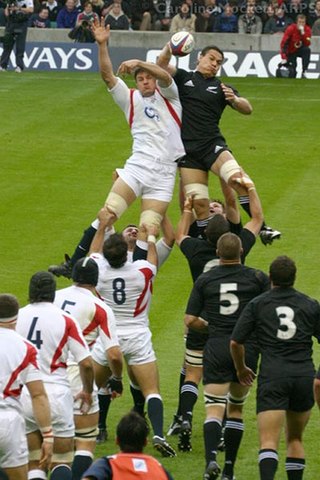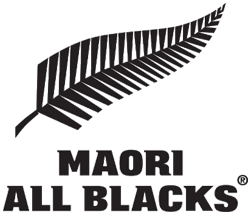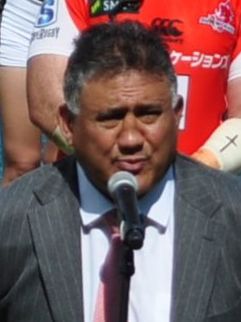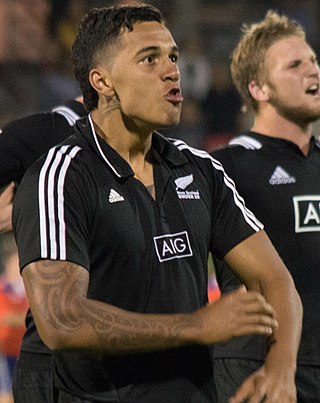Related Research Articles

The New Zealand national rugby union team, commonly known as the All Blacks, represents New Zealand in men's international rugby union, which is considered the country's national sport. Famed for their international success, the All Blacks have often been regarded as one of the most successful sports teams in history.

New Zealand Rugby (NZR) is the governing body of rugby union in New Zealand. It was founded in 1892 as the New Zealand Rugby Football Union (NZRFU), 12 years after the first provincial unions in New Zealand. In 1949 it became an affiliate to the International Rugby Football Board, now known as World Rugby, the governing body of rugby union for the world. It dropped the word "Football" from its name in 2006. The brand name New Zealand Rugby was adopted in 2013. Officially, it is an incorporated society with the name New Zealand Rugby Union Incorporated.

Piri Awahou Tihou Weepu is a retired New Zealand rugby union player. Weepu played most recently for Wairarapa Bush in the Heartland Championship. Generally Weepu played as a half-back but also played at first five-eighth on occasion. He has represented the New Zealand national side, the All Blacks, between 2004 and 2013. He first won national honours against Wales in 2004. In 2005 was called back into the All Blacks squad for the first Tri Nations test against South Africa, having missed selection for the 2005 British & Irish Lions tour. He represented the Hurricanes and Blues in Super Rugby, and Wellington and Auckland in the Mitre 10 Cup. He also had brief spells with several clubs in Europe. In October 2017, Weepu announced his retirement as a rugby player.

Halt All Racist Tours (HART) was a protest group set up in New Zealand in 1969 to protest against rugby union tours to and from South Africa. Founding member Trevor Richards served as president for its first 10 years, with fellow founding member John Minto then serving as president until South Africa dismantled apartheid in the early 1990s.

Rugby union has been played in New Zealand since 1870 and is the most popular sport in the country as well as being its national sport. In a 2023 survey, 75% of respondents said they followed the sport.

The Māori All Blacks, previously called the New Zealand Maori, New Zealand Maoris and New Zealand Natives, are a rugby union team from New Zealand. They are a representative team of the New Zealand Rugby Union, and a prerequisite for playing is that the player has Māori whakapapa (genealogy). In the past this rule was not strictly applied; non–Māori players who looked Māori were often selected in the team. These included a few Pacific island players and a couple of African descent. Today all players have their ancestry verified before selection in the team.
Haka, traditional dances of the Māori people, have been used in sports in New Zealand and overseas. Haka are performed to challenge opponents before matches. The dance form has been adopted by the New Zealand national rugby union team, the "All Blacks", the Māori All Blacks, New Zealand women's national rugby union team, the "Black Ferns" and a number of other New Zealand national teams perform before their international matches; some non-New Zealand sports teams have also adopted haka.

Cory Steven Jane is a New Zealand international rugby union player.
Norman Rangi Berryman was a New Zealand rugby union player who played as a winger and centre. He played one Test for the All Blacks, and represented Northland, the Crusaders and the Chiefs in New Zealand. In France, he played for Castres Olympique and CS Bourgoin-Jallieu.

James Whitinui Joseph is a New Zealand-born Japanese former rugby union player and current rugby union coach. A flanker, Joseph represented Otago at a provincial level, and was a member of the New Zealand national side, the All Blacks, from 1992 to 1995, before representing Japan in 1999. Joseph, now head coach of the Japanese national side, has coached since his retirement, coming through the ranks in New Zealand before his first national stint.
1949 saw the second full tour of South Africa by a representative New Zealand rugby union team. The All Blacks achieved a record of 13 wins, 7 losses and 4 draws, and they lost the test series 4–0.

Aaron Luke Smith is a New Zealand professional rugby union player. A scrum half, Smith played for the Highlanders in Super Rugby where upon retirement in 2023 was the club's all time leader in caps, and for Manawatu in the ITM Cup. He has won 124 caps for New Zealand and is their 2nd most-capped back after Beauden Barrett.
The 1908 New Zealand Māori rugby league tour of Australia was a tour made by a group of New Zealand Māori rugby footballers who played rugby league matches in Queensland and New South Wales. The tour had a large role in helping the New South Wales Rugby League establish itself in Sydney. As a result, the tour is a significant part of rugby league history. Financial and legal issues disrupted the end of the tour and an exhibition match held under rugby union rules was held to help pay for the team's return voyage to New Zealand.
The 1960 New Zealand rugby union tour of South Africa, was a series of rugby union matches played by the New Zealand national rugby union team in South Africa and Rhodesia.

Rugby union and apartheid had a complex and supportive relationship. From 1948 to 1994, international rugby relations with the country, and also the non-integrated nature of rugby within South Africa drew frequent controversy. South Africa remained a member of the International Rugby Board (IRB) throughout the apartheid era.
Scott Crichton is a former New Zealand rugby union player. A prop, educated at Wanganui Boys' College, Whanganui. After transferring to the Capital he played club rugby for the Karori, Oriental-Rongotai, Athletic and Western Suburbs rugby football clubs in Wellington.

Nehe Rihara Milner-Skudder is a New Zealand rugby union player who currently plays for the Rugby New York.

Akira Ioane is a New Zealand rugby union player. Ioane plays blindside flanker and number 8 for the Auckland rugby union team in the Mitre 10 Cup, for the Blues in the Super Rugby competition and was selected for the All Blacks in 2017, having previously represented New Zealand internationally in Sevens and the Māori All Blacks.

Sean Wainui was a New Zealand rugby union player. He played on the wing for provincial side Bay of Plenty, the Chiefs in Super Rugby, and for New Zealand's Māori international side the Māori All Blacks.
Reed Prinsep is a New Zealand rugby union player who currently plays as a loose forward for Canterbury in New Zealand's domestic Mitre 10 Cup and for the Hurricanes in the international Super Rugby competition.
References
- 1 2 Electoral district of Southern Maori: main roll of persons entitled to vote for Members of Parliament of New Zealand. 1969. p. 81.
- 1 2 Knight, Lindsay. "Wattie Reside". New Zealand Rugby Union. Retrieved 6 October 2015.